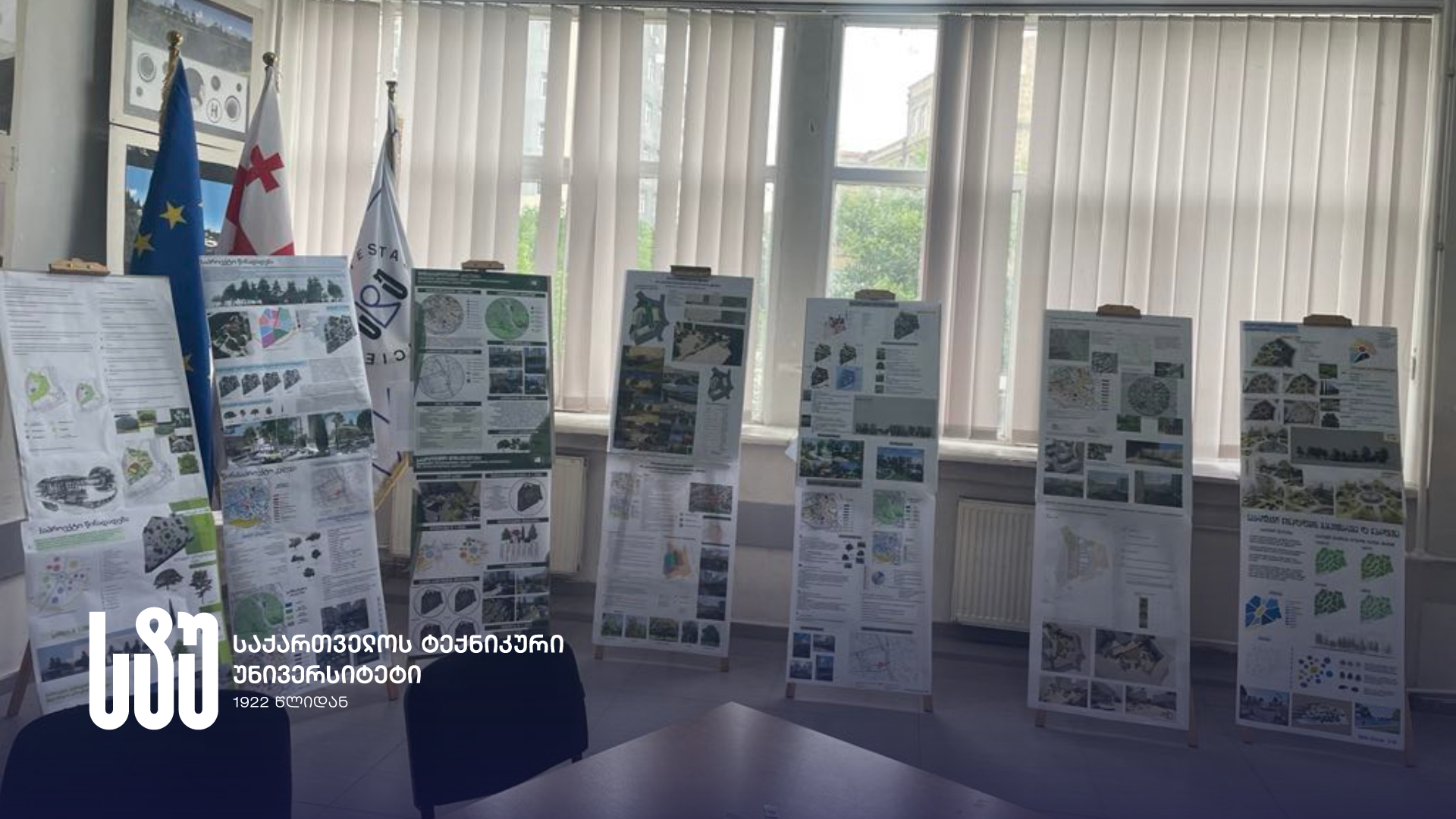PhD student of GTU researched Supply Chain Management Optimization issues in global business development
05-08-2024
Nino Kvaraya, PhD candidate of the Faculty of Energy of the Georgian Technical University, under the guidance of Professor Archil Samadashvili, researched the optimization of supply chain management, using the role of supply chains in the development of global business and automation opportunities.
The aim of the thesis topic – “Reengineering of supply chains” is to effectively use the technological capabilities of the so-called fourth industrial revolution (“Industry 4”) and take into account the challenges in managing global supply chains, creating a local supply chain hub model with a center in Georgia, which ensures that the requirements of European and Middle Eastern countries for services and supplies are met. At the same time, it functions as a full-fledged supplier of value creation, with production offers from neighboring countries of Georgia and the South Caucasus that don’t have direct access to the Black Sea.
According to PhD student Nino Kvaraya, global supply chains have always been vulnerable to risks associated with unpredictable events, such as natural disasters, trade wars, pandemics, domestic political instability, and more.
“The coronavirus pandemic almost halted global activity in all economic sectors and industries. The outbreak of the virus in China, one of the main centers of production and distribution globally, had a crucial impact on the supply of finished and semi-finished products globally that are logistically connected to China.
The supply shock that began in China in February 2020, and the demand shock that followed it after the partial shutdown of the global economy exposed vulnerabilities in manufacturing strategies and supply chains.
These events and the US-China trade war have led to a rise in economic nationalism. As a result, producers worldwide are under greater political and competitive pressure to increase their domestic production, increase employment in their own countries, reduce or even eliminate dependence on sources considered risky, and reconsider their use.
Against this background, the planning of production processes and the use of outsourcing, which is widespread in modern industries, have forced most companies to reconsider the needs of the global supply chain and support the idea of creating local hubs.
Historically, Georgia’s favorable geopolitical location and the deepening of economic relations with trade partner countries, such as the development of bilateral, regional, and multilateral trade relations, preferential and free trade regimes, as well as activities to strengthen Georgia’s transit and logistics potential, simplified tax and customs procedures, open new perspectives for Georgia, for the positioning of the country with the status of a regional hub”, said the doctorate student.
According to GTU Associate Professor - Archil Samadashvili, the work of PhD student Nino Kvaraya analyzes the role of supply chains in the development of global business.
Also, issues of supply chain management optimization using automation capabilities and drawbacks in the functioning of global supply chains in pandemic conditions are identified, and the need for their organizational transformation - reengineering is substantiated.
“Business Processes Reengineering methodology BPR (Business Processes Reengineering) is selected as the theoretical and operational basis of the transformation, the feasibility of using it as a strategic tool is justified, the advantages of organizing and managing local supply chains operating based on “Industry 4.0” technologies and considering the favorable geopolitical location of our country are discussed, and the possibility of creating a supply chain hub in Georgia is substantiated”, noted Archil Samadashvili.
The conducted studies unequivocally prove that the Covid-19 pandemic and the unstable political environment created problems for the functioning of the global supply, which was mainly manifested in the breakdown of its sustainability; In order to increase the sustainability of supply chains, manufacturers around the world are developing domestic production in their own countries to reduce or even completely eliminate dependence on sources considered risky and to review strategies for their use, that involves reengineering existing supply chains and organizing local chains; In supply chains, as well as in virtually all industrial fields, the systematic use of the capabilities and tools of “Industry 4.0” becomes the basis for organizing value addition in a new way; The implementation of the “Digital twin” in manufacturing industries allows the creation of a virtual management model of the supply chain, the process of all stages of which will be realized in real time with a virtual representation.
If production works with a digital twin distribution model of products using a combination of artificial intelligence (AI) and blockchain, the minimization of stocks in the value chain, information traceability and visibility, contract tracking, cost reduction, and increased flexibility will be guaranteed; Business entities that automate the operation of supply chains improve the efficiency and security of supply chains by connecting applications, simplifying and accelerating processes; Due to its geopolitical location and transport infrastructure, Georgia has a real perspective to become a regional supply hub based on the latest technologies, which will be able to replace the transit route from China to Russia to Europe and the Middle East countries; Georgia has a chance to become a full-fledged supplier of value to Europe by using the technological capabilities of “Industry 4.0”, based on the transformation of business models of enterprises and their retooling, with production offers from neighboring countries of Georgia and the South Caucasus, which do not have direct access to the Black Sea; In the process of reengineering supply chains, which is related to the creation of local chains and the development of alternative transit schemes, to achieve a competitive advantage, it is also relevant to train qualified personnel, reduce bureaucratic barriers, harmonize tariff legislation between countries, protect information, speed of processing, accuracy and others.
For information: Nino Kvaraya received a Bachelor’s and master’s education in the USA, namely at Fort Lewis College (Colorado, USA), with a qualification of Bachelor of Business Administration, concentration in International Business. Also, Binghamton University, State University of New York, School of Management.
Qualifications Awarded - Master of Business Administration with a concentration in Supply Chain Management. Since 2018, she has been working in the multinational brand of professional services firms, PwC (PricewaterhouseCoopers International Limited), which is the second largest professional services network in the world and is considered one of the Big Four, along with Deloitte, EY, and KPMG, and since 2022 has been in the position of Customs and International Trade Manager in the New York office.
The aim of the thesis topic – “Reengineering of supply chains” is to effectively use the technological capabilities of the so-called fourth industrial revolution (“Industry 4”) and take into account the challenges in managing global supply chains, creating a local supply chain hub model with a center in Georgia, which ensures that the requirements of European and Middle Eastern countries for services and supplies are met. At the same time, it functions as a full-fledged supplier of value creation, with production offers from neighboring countries of Georgia and the South Caucasus that don’t have direct access to the Black Sea.
According to PhD student Nino Kvaraya, global supply chains have always been vulnerable to risks associated with unpredictable events, such as natural disasters, trade wars, pandemics, domestic political instability, and more.
“The coronavirus pandemic almost halted global activity in all economic sectors and industries. The outbreak of the virus in China, one of the main centers of production and distribution globally, had a crucial impact on the supply of finished and semi-finished products globally that are logistically connected to China.
The supply shock that began in China in February 2020, and the demand shock that followed it after the partial shutdown of the global economy exposed vulnerabilities in manufacturing strategies and supply chains.
These events and the US-China trade war have led to a rise in economic nationalism. As a result, producers worldwide are under greater political and competitive pressure to increase their domestic production, increase employment in their own countries, reduce or even eliminate dependence on sources considered risky, and reconsider their use.
Against this background, the planning of production processes and the use of outsourcing, which is widespread in modern industries, have forced most companies to reconsider the needs of the global supply chain and support the idea of creating local hubs.
Historically, Georgia’s favorable geopolitical location and the deepening of economic relations with trade partner countries, such as the development of bilateral, regional, and multilateral trade relations, preferential and free trade regimes, as well as activities to strengthen Georgia’s transit and logistics potential, simplified tax and customs procedures, open new perspectives for Georgia, for the positioning of the country with the status of a regional hub”, said the doctorate student.
According to GTU Associate Professor - Archil Samadashvili, the work of PhD student Nino Kvaraya analyzes the role of supply chains in the development of global business.
Also, issues of supply chain management optimization using automation capabilities and drawbacks in the functioning of global supply chains in pandemic conditions are identified, and the need for their organizational transformation - reengineering is substantiated.
“Business Processes Reengineering methodology BPR (Business Processes Reengineering) is selected as the theoretical and operational basis of the transformation, the feasibility of using it as a strategic tool is justified, the advantages of organizing and managing local supply chains operating based on “Industry 4.0” technologies and considering the favorable geopolitical location of our country are discussed, and the possibility of creating a supply chain hub in Georgia is substantiated”, noted Archil Samadashvili.
The conducted studies unequivocally prove that the Covid-19 pandemic and the unstable political environment created problems for the functioning of the global supply, which was mainly manifested in the breakdown of its sustainability; In order to increase the sustainability of supply chains, manufacturers around the world are developing domestic production in their own countries to reduce or even completely eliminate dependence on sources considered risky and to review strategies for their use, that involves reengineering existing supply chains and organizing local chains; In supply chains, as well as in virtually all industrial fields, the systematic use of the capabilities and tools of “Industry 4.0” becomes the basis for organizing value addition in a new way; The implementation of the “Digital twin” in manufacturing industries allows the creation of a virtual management model of the supply chain, the process of all stages of which will be realized in real time with a virtual representation.
If production works with a digital twin distribution model of products using a combination of artificial intelligence (AI) and blockchain, the minimization of stocks in the value chain, information traceability and visibility, contract tracking, cost reduction, and increased flexibility will be guaranteed; Business entities that automate the operation of supply chains improve the efficiency and security of supply chains by connecting applications, simplifying and accelerating processes; Due to its geopolitical location and transport infrastructure, Georgia has a real perspective to become a regional supply hub based on the latest technologies, which will be able to replace the transit route from China to Russia to Europe and the Middle East countries; Georgia has a chance to become a full-fledged supplier of value to Europe by using the technological capabilities of “Industry 4.0”, based on the transformation of business models of enterprises and their retooling, with production offers from neighboring countries of Georgia and the South Caucasus, which do not have direct access to the Black Sea; In the process of reengineering supply chains, which is related to the creation of local chains and the development of alternative transit schemes, to achieve a competitive advantage, it is also relevant to train qualified personnel, reduce bureaucratic barriers, harmonize tariff legislation between countries, protect information, speed of processing, accuracy and others.
For information: Nino Kvaraya received a Bachelor’s and master’s education in the USA, namely at Fort Lewis College (Colorado, USA), with a qualification of Bachelor of Business Administration, concentration in International Business. Also, Binghamton University, State University of New York, School of Management.
Qualifications Awarded - Master of Business Administration with a concentration in Supply Chain Management. Since 2018, she has been working in the multinational brand of professional services firms, PwC (PricewaterhouseCoopers International Limited), which is the second largest professional services network in the world and is considered one of the Big Four, along with Deloitte, EY, and KPMG, and since 2022 has been in the position of Customs and International Trade Manager in the New York office.


